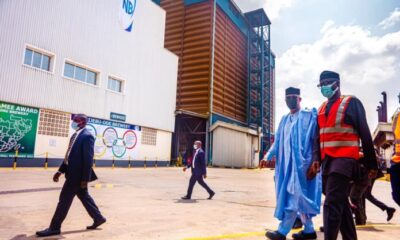In 2019, Africa’s GDP was $2,6 trillion, but new research from McKinsey estimates that this could have been closer to $3 trillion if the continent had managed to continue to grow at the pace it achieved from 2000 to 2010. Fully 65 percent of this difference can be explained by a drop off in growth in Africa’s “big three” economies, Egypt, South Africa, and Nigeria, with Nigeria having the largest impact.
The research, published today in a flagship report: Reimagining economic growth in Africa: Turning diversity into opportunity takes a granular look at Africa’s economic performance across countries, sectors, and companies, to highlight successes, identify obstacles to growth, and suggest ways the continent can harness its diversity to reignite growth after a decade of slowdown.
Nigeria is one of 13 African countries that the research classifies as “recent slowdowns”, economies that outperformed the continent’s average economic growth in the first decade of the millennium, but have since slowed between 2010-2019.
The slowing pace of economic growth in these 13 countries—representing 37 percent of Africa’s population and around 46 percent of its GDP in 2019—was driven by slower than average growth in exports and investment per capita compared to the rest of Africa, even though they had the highest levels of urbanization. These economies account for over half of the continent’s exports of primary commodities. Between 2010 and 2019, growth in these countries did not keep pace with population growth—in aggregate, 27 million more people in this cluster lived in poverty at the end of the period—and per capita consumption growth was stagnant at 0.8 percent a year on average.
However, the slow growth in these countries is not representative of the entire continent.
The report stresses Africa’s diversity and points out that nearly half its people live in countries where economies have grown consistently over the past 20 years. Economic growth in these primarily midsized economies in East and West Africa has averaged more than 4 percent annual GDP growth.
“In a stark illustration that there is no ‘one Africa’, decelerating growth among recent slowdown and slow grower economies combined to slow the continent’s growth. Nigeria had the largest impact. Its services sector alone was responsible for 30 percent of the continent’s slowing economic pace.” – Mayowa Kuyoro, partner in McKinsey’s Lagos office and co-author of the report.
Reaping the productivity dividend
As the fastest urbanizing continent on Earth, and home to a young and fast-growing workforce and growing consumer class, the report argues that, despite its disappointing performance over the past decade, Africa is an exciting new market that is ripe for prosperity.
One of the key trends driving this optimism is the fact that the African economy has been undergoing a profound structural shift to services over the past 20 years, as people left work in the fields to take jobs in trade and other services in cities. Employment in services increased from 30 percent to 39 percent over that period and the sector is set to absorb almost half of all new labor-market entrants by 2030, although in 2019, half the African workforce remained in agriculture.
But while services create significant opportunities for African countries to boost economic output and job creation, this can only be realized if productivity in the sector improves. In 2019, African services productivity was the lowest of any region in the world and the sector recorded negative productivity growth of -0.1 percent during the 2010-2019 decade. This is, in part, due to a skewed shift to certain subsectors, notably trade, that has low productivity by global standards due to high levels of informality and fragmentation. In contrast, financial and business services are highly productive and contribute the greatest economic value, accounting for nearly a fifth of Africa’s GVA today.
Targeted interventions to raise productivity across services include increasing digitization, developing skills, and exporting talent. The research found that if Africa matched the productivity growth of Asia’s strongest services hubs, it could add $1.4 trillion to the continent’s economy, almost doubling of the GVA from services today. This would create 225 million jobs by 2030—a crucial consideration in the light of Africa’s rapidly growing workforce.
Additional opportunities for productivity-led growth identified in the report lie in increasing domestic and export manufacturing to meet burgeoning local demand, increasing regional connectedness, investing to enhance resource productivity and to tap into new opportunities notably to support the global transition to net zero, and spurring the agricultural transition. Agricultural provides almost half of Africa’s employment and is crucial to the continent’s food security, so improving its productivity is important to lives and livelihoods, especially in light of rising threats from climate change and rapid urbanization.
“Productivity must be established as the foundation of economic growth and resilience on the continent. Africa can no longer rely on growth determined by the vicissitudes of the global demand for commodities and export markets. Its complex, multifaceted diversity and thriving demographics are assets that can be developed and fostered to support a productivity-led economy.” – Mayowa Kuyoro, partner in McKinsey’s Lagos office and co-author of the report.

 Forex2 weeks ago
Forex2 weeks ago


 Naira2 weeks ago
Naira2 weeks ago
 Naira4 weeks ago
Naira4 weeks ago
 Company News4 weeks ago
Company News4 weeks ago
 Billionaire Watch1 week ago
Billionaire Watch1 week ago




 Naira2 weeks ago
Naira2 weeks ago




 Naira1 week ago
Naira1 week ago




 Naira4 weeks ago
Naira4 weeks ago






















